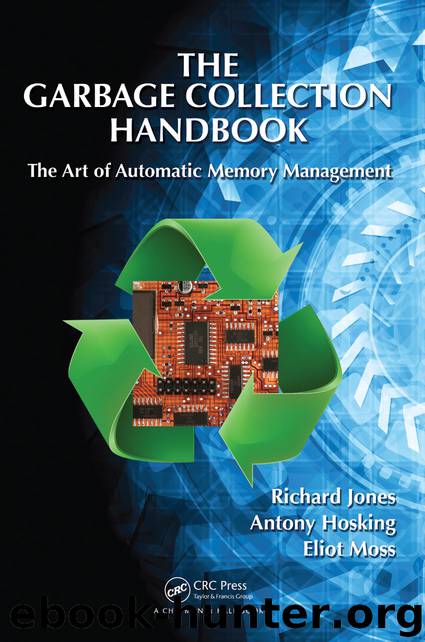The Garbage Collection Handbook by Jones Richard; Hosking Antony; Moss Eliot

Author:Jones, Richard; Hosking, Antony; Moss, Eliot
Language: eng
Format: epub
Publisher: CRC Press
12.3 Issues to consider
While we have termed finalisation and weak pointers ‘language-specific’ concerns, they are now largely part of the accepted landscape of automatic memory management. Automatic management is a software engineering boon, enabling easier construction of more complex systems that work correctly, but various specific problems motivate finalisation and weak pointers as extensions to language semantics — extensions that have been introduced precisely because of the assumption that memory will be managed automatically.
If the collector and run-time system implementer receive the language being implemented as a given, then many of the design considerations mentioned here have already been decided: the language is what it is. The design questions mentioned earlier, particularly with respect to choices in the design of support for finalisation, are more relevant in the context of designing a new programming language. Likewise, the varieties of weak pointer mechanisms, such as which ‘weak’ data structures to offer, how many strengths of references to support, and so on, are also more the province of language design.
Where a collector and run-time system implementer has more scope is in the choice and design of allocation and collection techniques. Here are some of the considerations of how those choices relate to the mechanisms discussed in this chapter.
• Weak pointers and finalisation tend to require additional tracing ‘passes’. These typically complete quickly — their performance is typically not of unusual concern. However, they complicate otherwise basic algorithms, and require considerable care in their design. It is best to design in the necessary support from the beginning rather than to attempt to add it on later. Needless to say, it is very important to gain a solid understanding of the semantics of the features and of how proposed implementation strategies enact those semantics.
• Some mechanisms, notably some of the ‘strengths’ of Java’s weak references, require that a whole group of related weak references be cleared at the same time. This is relatively easy to accomplish in a stop-the-world collector, but in a more concurrent setting it requires additional mechanism and care. As mentioned in earlier discussion, traversing the weak references needs to include a check of a shared flag and possibly some additional synchronisation, to ensure that collector and mutator threads make the same determination as to which weakly-referenced objects are live — they need to resolve the race between any mutator thread trying to obtain a strong reference and the collector trying to clear a group of weak references atomically. This race is by no means peculiar to Java’s weak reference mechanisms, and is a potentiality in supporting weak pointers in any concurrent setting.
• Given the concerns about atomic clearing of sets of weak references and the general complexity of weak pointer and finalisation support, it may be reasonable to handle those features in a stop-the-world phase of an otherwise concurrent collector, or at least to use locks rather than lock-free or wait-free techniques. Chapter 13 discusses these different approaches to controlling concurrent access to data structures.
• Java soft references require a
Download
This site does not store any files on its server. We only index and link to content provided by other sites. Please contact the content providers to delete copyright contents if any and email us, we'll remove relevant links or contents immediately.
Modelling of Convective Heat and Mass Transfer in Rotating Flows by Igor V. Shevchuk(6432)
Weapons of Math Destruction by Cathy O'Neil(6264)
Factfulness: Ten Reasons We're Wrong About the World – and Why Things Are Better Than You Think by Hans Rosling(4731)
A Mind For Numbers: How to Excel at Math and Science (Even If You Flunked Algebra) by Barbara Oakley(3301)
Descartes' Error by Antonio Damasio(3270)
Factfulness_Ten Reasons We're Wrong About the World_and Why Things Are Better Than You Think by Hans Rosling(3230)
TCP IP by Todd Lammle(3180)
Fooled by Randomness: The Hidden Role of Chance in Life and in the Markets by Nassim Nicholas Taleb(3105)
The Tyranny of Metrics by Jerry Z. Muller(3065)
Applied Predictive Modeling by Max Kuhn & Kjell Johnson(3064)
The Book of Numbers by Peter Bentley(2964)
The Great Unknown by Marcus du Sautoy(2690)
Once Upon an Algorithm by Martin Erwig(2641)
Easy Algebra Step-by-Step by Sandra Luna McCune(2628)
Lady Luck by Kristen Ashley(2576)
Police Exams Prep 2018-2019 by Kaplan Test Prep(2540)
Practical Guide To Principal Component Methods in R (Multivariate Analysis Book 2) by Alboukadel Kassambara(2538)
All Things Reconsidered by Bill Thompson III(2389)
Linear Time-Invariant Systems, Behaviors and Modules by Ulrich Oberst & Martin Scheicher & Ingrid Scheicher(2364)
